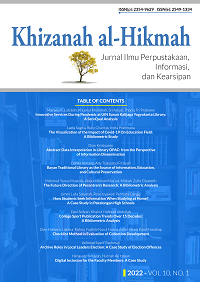Digital Inclusion for the Faculty Members: A Case Study
Abstract
The field of information is undergoing a very rapid transformation with the use of information technology in every community activity. The use of information technology that is increasingly friendly in the community has facilitated work management to be more effective and efficient so as to accelerate performance. However, the diverse geographical conditions of society have led to a digital divide in technology accessibility in Indonesian society, while the rapid development of technology demands equal distribution of capabilities and mastery of technology throughout the wider community. As an institution that is an information center, the role of libraries is very important in encouraging people to use information technology through digital inclusion. Libraries can carry out the role of digital inclusion through the provision of technology tools, freedom of access by the community. This study examines the role of libraries in digital inclusion with students as part of a community group. The research was carried out with a quantitative approach through the distribution of questionnaires, to determine student responses regarding the availability of information technology devices provided by the library, their accessibility and ability to utilize these facilities. The results of this study found that the information technology facilities provided by the library and the ease of access have helped students to get information sources easily and quickly. The provision of adequate information technology facilities and easy access to libraries has played a role in helping students to become more familiar with digital devices, so that they can adapt quickly to any existing technological developments.
Downloads
References
Afriani, I. H. A. (2021). Daya Manusia, Inklusi Teknologi Digital dan Pertumbuhan Ekonomi di Indonesia. Jurnal Manajemen Jayanegara, 13(1), 27–31.
Bradshaw, H. . (2011). Digital Inclusion: Economic and social benefits for individuals and wider society. In Freshminds/UK Online Centres. Welsh Government Social Research.
FreshMinds (2008). Economic Benefits of Digital Inclusion: Building the Evidence. Freshminds/UK Online Centres. Available at: ttp://www.tinderfoundation.org/sites/default/files/research-publications/economic_benefits_of_digital_inclusion_building_the_evidence.pdf (accessed 9 Januari 2022)
Hadiyat, Y. D. (2014). Kesenjangan Digital di Indonesia (Studi Kasus di Kabupaten Wakatobi). Jurnal Pekommas, 17(2), 81–90.
Hartnett, M.K., Mentis, M., Butler, P., & Carvalho, L. (2020). Public Libraries and Digital Inclusion Research Report.
Helsper, E. . (2008). Digital Inclusion: An Analysis of Social Disadvantage and the Information Society. Communities and Local Government Publications.
Lee Y, J. M. and K. J. (2010). Strategies and implications for the social integration of the digital age. . . IT&SOCIETY, 20, 1–29.
López-Sintas, J., Lamberti, G., Sukphan, J. (2020). The Social Structuring of the Digital Gap in a Developing Country. The Impact of Computer and Internet Access Opportunities on Internet use in Thailand. Technology in Society, 63.
OCLC WebJunction (2014). What is Digital Inclusion? Available at: http://www.webjunction.org/explore-topics/digital-inclusion.html. (accessed 9 Januari 2022).
Qalyubi, S. (2003). Dasar-Dasar Ilmu Perpustakaan Dan Informasi. Jurusan Ilmu Perpustakaan Dan Informasi Fakultas Adab IAIN Sunan Kalijaga.
Real, B., Bertot, JC & Jaeger, P. (2013). Rural Public Libraries and Digital Inclusion: Issues and Challenges. Information Technology and Libraries, 33(1), 6–24.
Sa’diyah, l, & Adli, M. . (2019). Perpustakaan di Era Teknologi Informasi. Jurnal Al Maktabah, 4(4).
Soenhadji, I. M., & Susiloatmadja, R. (2011). Pemanfaatan Internet oleh Mahasiswa sebagai Media Pencarian dan Penelusuran Informasi. Jurnal Ilmiah Ekonomi Bisnis, 12(3).
Supriyanto, W. & Muhsin, A. (2008). Teknologi Informasi Perpustakaan. Kanisius.
Wibawanto, A. (2018). Penggunaan Internet Dalam Perpustakaan. Pustakaloka, 10(2), 191–203.
By submitting your manuscript to our journal, you are following Copyright and License

